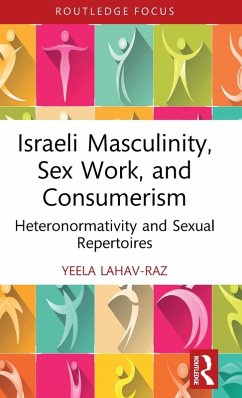Israeli Masculinity, Sex Work, and Consumerism: Heteronormativity and Sexual Repertoires explores the inner world of Israeli sex work consumers and their use of digital technologies on which intense feelings of social togetherness and belonging create a localized form of homosociality and brotherhood.
The first of its kind to offer an in-depth analysis of masculine sexual repertoires in the field of sex consumption, this book uses extensive data and observations of online ethnography among a community of Israeli sex consumers operating online. It elucidates the economics of demand in the field of sexual consumption and highlights how the rise of the thriving online communities of sex consumers can function as a platform on which power relations between men themselves are publicly displayed and are constantly challenged.
Israeli Masculinity, Sex Work, and Consumerism: Heteronormativity and Sexual Repertoires will be suitable for researchers in Gender and Sexuality Studies, Sociology, Anthropology and Criminology.
The first of its kind to offer an in-depth analysis of masculine sexual repertoires in the field of sex consumption, this book uses extensive data and observations of online ethnography among a community of Israeli sex consumers operating online. It elucidates the economics of demand in the field of sexual consumption and highlights how the rise of the thriving online communities of sex consumers can function as a platform on which power relations between men themselves are publicly displayed and are constantly challenged.
Israeli Masculinity, Sex Work, and Consumerism: Heteronormativity and Sexual Repertoires will be suitable for researchers in Gender and Sexuality Studies, Sociology, Anthropology and Criminology.








